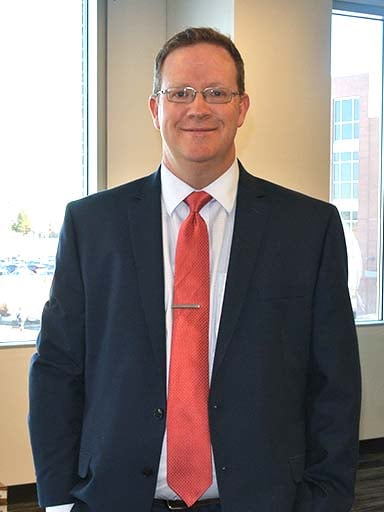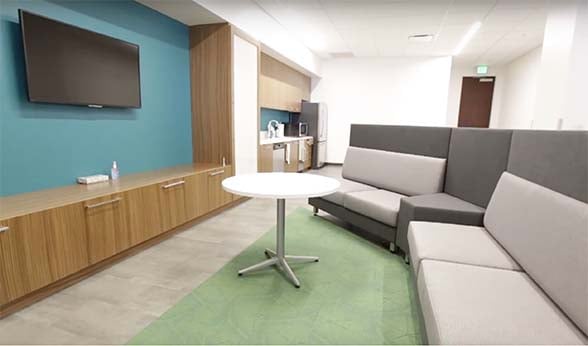Matt Vogl pays attention to swings. He’s a baseball fan, so he follows batters at the plate, especially his beloved St. Louis Cardinals. But his greater passion is seeing swings in behavioral health, especially those that move people toward happier, more productive lives.
Vogl knows that if not for one such serendipitous swing – a neighbor stepping in and transforming his own thoughts from utter despair to something approaching hope – he wouldn’t be here today. Now he stands on the cusp of the most satisfying opportunity of his career: Vogl, MPH, is executive director of the new National Behavioral Health Innovation Center (NBHIC) at the University of Colorado Anschutz Medical Campus.
The center will harness behavioral health assets that currently exist in Colorado and across the country to help implement innovative programs for schools, workplaces, courts, health care facilities, and anywhere else they’re needed.
 The National Behavioral Health Innovation Center recently opened on the second floor of the University Physicians building at CU Anschutz.
The National Behavioral Health Innovation Center recently opened on the second floor of the University Physicians building at CU Anschutz.
The NBHIC will operate out of the Office of the Chancellor. “This center will bring together behavioral health experts and community resources to produce new strategies that advance care in Colorado and across the nation,” said CU Anschutz Chancellor Don Elliman. “With the generous support of The Anschutz Foundation, the expertise available at CU Anschutz, and Matt Vogl’s vision and leadership, the National Behavioral Health Innovation Center will help implement innovative behavioral health programs wherever they’re needed in our society.”
Vogl said the field is set for something big, possibly a home run or two, to advance behavioral health. Although Colorado has struggled with mental health issues – occasional mass shootings, a high suicide rate and the nation’s lowest psychiatric bed capacity – the state now aims to lead in mental health services, he said. A few recent swings in momentum:
- The State Innovation Model, which touches every aspect of the state’s health system, including mental health.
- Gov. John Hickenlooper’s award of $18 million for crisis centers and a statewide crisis line.
- A state Suicide Prevention Board, relatively uncommon nationally.
- The Helen and Arthur E. Johnson Depression Center at CU Anschutz, which recently received an investment of $10 million from the Helen K. and Arthur E. Johnson Foundation.
- And now the NBHIC, which occupies 4,000 square feet on the second floor of University Physicians, Inc., 13199 E. Montview Blvd.
The center was made possible through a $10 million investment from The Anschutz Foundation. “When we met with The Anschutz Foundation, we said we wanted to be known as the state where innovation happens, where solutions are found,” Vogl said. “We plan to engage people across the spectrum of society.”
‘I wasn’t getting treatment’
 Matt Vogl is executive director of the National Behavioral Health Innovation Center.
Matt Vogl is executive director of the National Behavioral Health Innovation Center.
When Vogl moves to the new state-of-the-art space, a floor below the Helen and Arthur E. Johnson Depression Center, where he worked since 2008 (becoming deputy director in 2010), he plans to prominently display a bat signed by Jimmy Piersall, a Major League centerfielder in the 1950s and ‘60s. Piersall is a kindred spirit – he loves baseball and he has bipolar disorder.
Vogl nearly succumbed to his mental illness 13 years ago. He was headed to the basement to end his life when a neighbor, who had received training in suicide prevention, noticed his distressed condition as he got out of his car. She asked about his state of mind, then inquired if he’d been contemplating suicide. The floodgates opened.
“I came this close to dying from suicide (he shows a tiny space between thumb and forefinger) when my oldest son was a newborn. I wasn’t taking care of myself, wasn’t getting treatment. I sort of ignored it,” he said. “Now, I’m really fueled by my passion for mental behavioral services.”
Since that fateful day, Vogl has been treated and his condition is under control. Driving his desire for advancements in mental health are his two sons; he’s well aware that bipolar disorder has a genetic component. “If I can do the work now and make life a little easier for them if they develop (bipolar disorder), maybe they’ll come into a world where there’s less stigma and treatments are better,” he said. “And then they don’t have to get to a point like I did before they decide to take care of it.”
Vogl said it’s easy for people to keep their conditions hidden, which only reinforces the stigma around mental illness. That’s partly why he is open about his own condition. “Unless we come forward and show how we are taking care of ourselves,” he said, “how will people know what better looks like, or if better is even possible?”
‘All hands on deck’
One of Vogl’s favorite movie scenes comes from “Apollo 13” where the astronauts must quickly improvise, using the limited resources they have on hand, to fix CO2 scrubbers in the lunar module. Similarly, he said, today’s climate of lean resources makes it imperative to use what is currently available and build from it.
 The new National Behavioral Health Innovation Center features plentiful meeting space.
The new National Behavioral Health Innovation Center features plentiful meeting space.
Mental health issues cost the U.S. economy $210 billion a year (Journal of Clinical Psychiatry) and are one of the main drivers of health care expenses for employers. Improving integrated health care, facilitating mental health court programs (similar to drug courts), and training the next generation of professionals to be aware of mental health issues are just a few of the collaborative projects that NBHIC will advance.
“Why not take advantage of the fact we work for the largest university system in the state?” said Vogl, noting that instruction on behavioral health could be integrated across many disciplines. “And why stop there? Let’s engage other universities and get other schools to integrate mental health education into their curriculums. Let’s make this the norm. If we’re going to have an impact and solve this stuff, it’s all hands on deck.”
The NBHIC will be a national focal point where ideas will be exchanged with an eye toward getting effective projects off the ground quickly, Vogl said. The initial grant will fund the NBHIC through its first five years; after that, the center is committed to being self-sustainable.
“The goal for our shop is to develop real solutions that are up and running in the community to impact people’s lives,” he added.
‘What a gift’
Vogl said Anschutz Foundation resources, strong support from the chancellor and a “dream team of thinkers” are combining to, quite literally, load the bases.
Toss in his personal passion for behavioral health, and the NBHIC appears ready to take on one of the nation’s most pressing health concerns.
“It’s hands-down the most exciting thing I’ve ever done professionally – and terrifying all at once,” Vogl said. “You don’t get a lot of opportunities like this in life, so I’m keenly aware of what a gift this is. And that’s going to help me ensure that I’m successful.”
